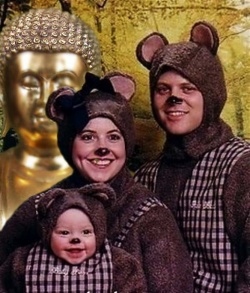Co-Living Movement of both organic and inorganic substances
Buddhism provides an ideological basis for the coexistence of all things. Each living thing contributes to the harmony of the grand concert of symbiosis. The Buddhist term "dependent origination" describes such symbiotic relationships, as nothing and no one exists in isolation. Each individual being is destined to function to create an environment that sustains all other existences. This is the conceptual framework through which Mahayana Buddhism, and specifically the Pure Land tradition, views the universe. Pure Land Buddhism today should develop itself as a reformed Buddhism and show pragmatic concepts concurrent with "modern" ethos such as individualism, egalitarianism of community, and social engagement. By implementing these elements, Jodo Shu will be able to establish a new form of Pure Land Buddhism according to societal requirements of the contemporary world.
The Buddhist law of dependent origination presents a holistic approach to all phases of secular life so that it encompasses all aspects of morality. One of Pure Land Buddhism's characteristic aspects asks us to make a detailed inquiry into "otherness" and the reality of what is different or alien. This inquiry will expose our innate dependency. From this standpoint of the relationship of mutual-dependency and otherness, we find the Pure Land tradition has some ideas to offer in the quest for answers to socially problematic issues. This is because this tradition adapts the insight of one's co-existence into life to harmonize with natural laws and human communality. Encouraging community through interdependent cooperation is the cornerstone for developing a soteriological system of establishing a Pure Land here on earth.
Recognizing the necessity of societal revitalization from the basis of Pure Land Buddhism, Rev. Shiio Benkyo, who was an outstanding engaged Buddhist activist of Jodo Shu, founded a social reform activity named the "Co-Living Movement" in the early 1920's. This movement centered on applying Honen's teachings to daily life for the betterment of society. Shiio asserted that we should actualize the salvation of Amida Buddha in social and daily life. He based his principle on the fundamental doctrine of dependent origination and the interconnectedness of all things, reinterpreted with regard to the matrix of human society. He coined a slogan for public campaigning called tomo-iki, literally meaning "co-living", to symbolize his philosophy of living together among all sentient beings. He felt an exaggerated emphasis on other-worldliness could lead to escapism in disregarding people's responsibilities and obligations in actual society. Shiio then promoted his co-living philosophy for building a vibrant co-living world as a symbol of a dynamic, not static, Pure Land. We know he contributed himself to the establishment, for instance, of day-care centers and kindergartens within the precincts of Jodo Shu temples and to the engagement in other forms of social service in those days when Japan's social welfare system was immature.
Shiio's activities infused a new spirit into Honen's teaching of universal soteriology based on Amida Buddha's Original Vow in contemporary times. His co-living movement was very influential on the modernization of Buddhism in Japan and was his realistic answer to the symbiotic ideal of Pure Land Buddhism. It consisted of two main elements.
One is derived, as mentioned earlier, from the Buddha's teaching of dependent origination. The progression of causes and conditions is the reality which applies to all things, from the natural environment to the entire phenomena of human society and to the well-being and suffering that occurs in our own minds.
The other element is grounded in a hymnal passage appeared in Shan-tao's Liturgy for Birth. The phrase is: "I wish to be Born in the Land of Peace and Bliss together with all sentient beings." Shiio is said to have conceived of the idea of co-living from this very sentence. One of the issues we must always face is the creation of a determined way of thinking about life and death, and a new path of co-living to match it. Society dominated by modernism has placed a higher value on life than has any other period in human history. This excessive evaluation of human life is, however, no longer valid in the age of symbiosis. All beings, both organic and inorganic substances, are living together in an enormous scale of life cycle. Neither seeing human life as more important than any other form nor suggesting a return to the ecology of some pre-human age is important. All considerations in the argument of life and death are required to begin from the recognition of the existence of other life forms
